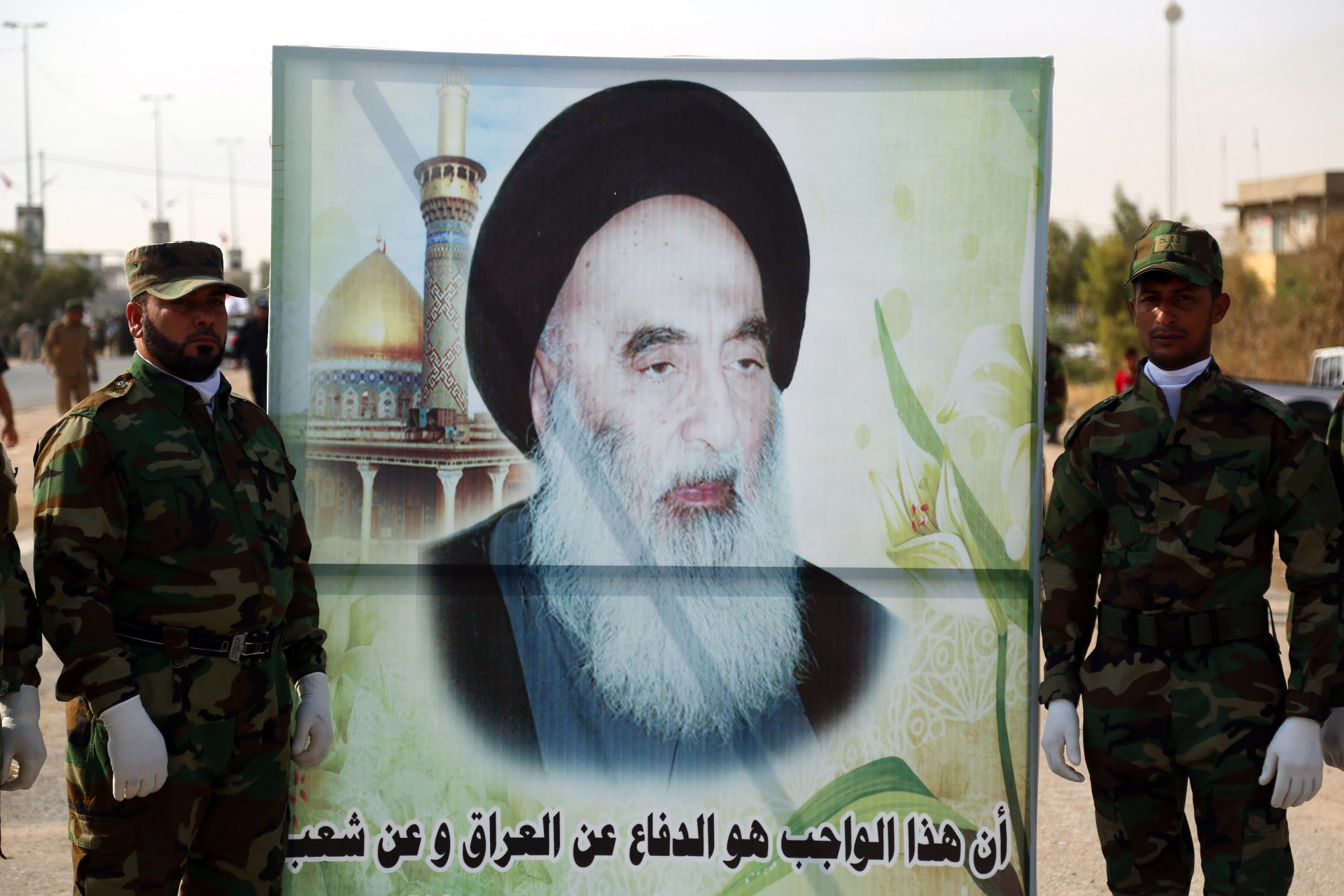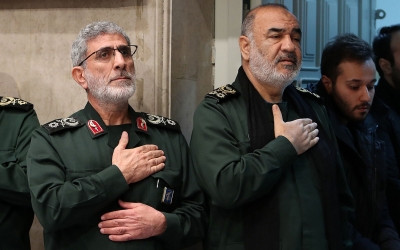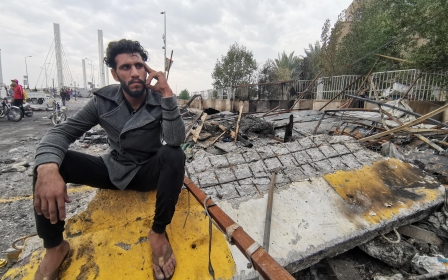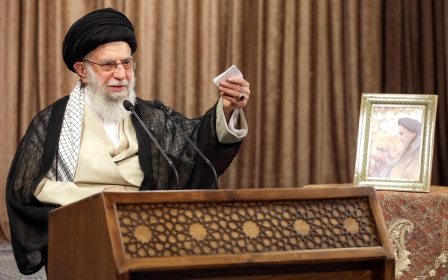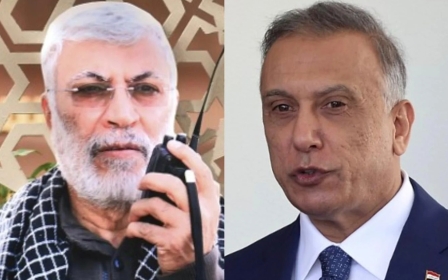Iraq's Sistani-backed factions break from Popular Mobilisation in blow to Iran
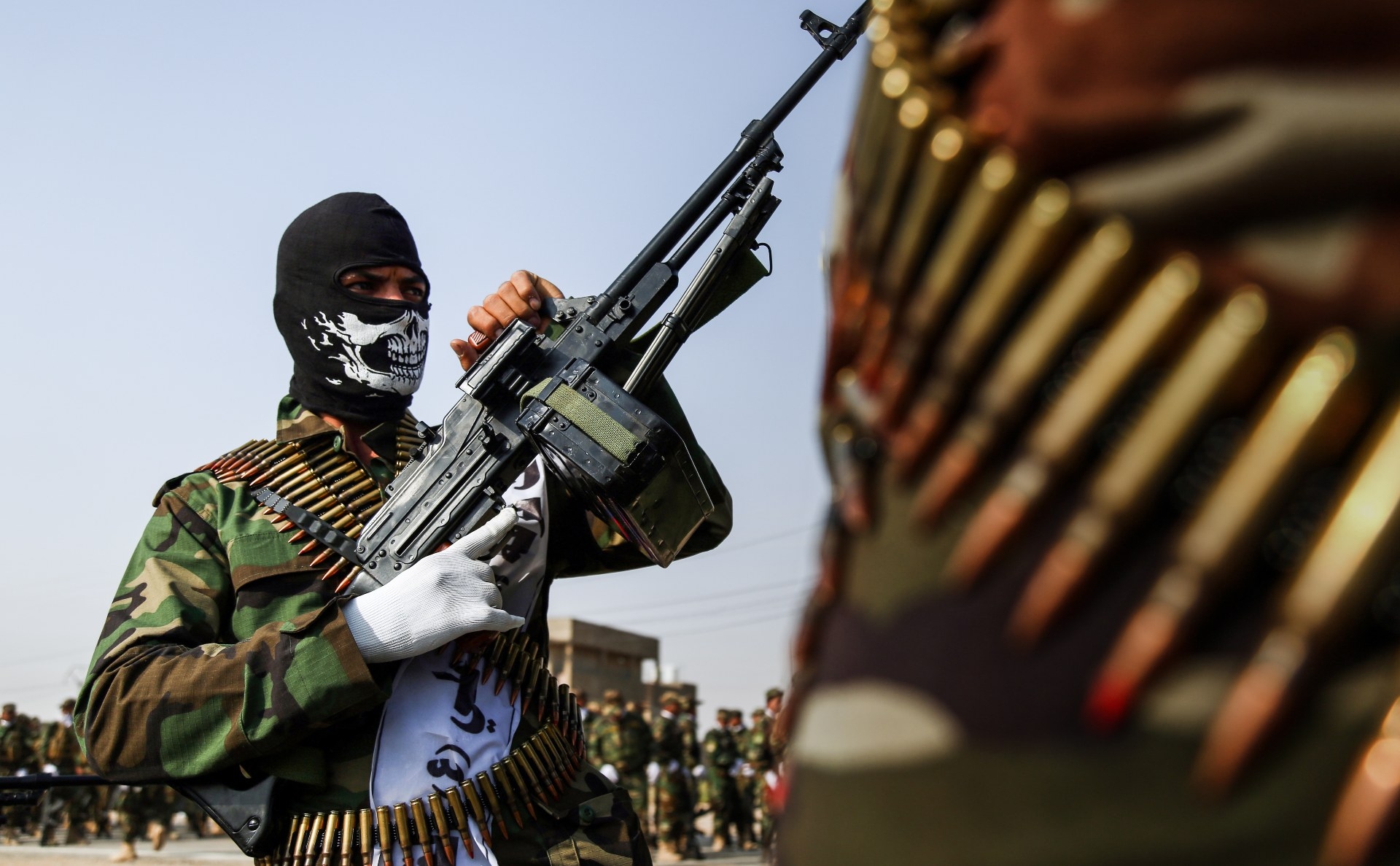
Four of Iraq’s Shia armed factions associated with Grand Ayatollah Ali al-Sistani are withdrawing from the Popular Mobilisation Authority (PMA) and forming a parallel force, commanders have told Middle East Eye.
This new force will be known as the Mobilisation of Holy Shrines and will be linked to Sistani and the religious authority he oversees in the Iraqi city of Najaf.
The announcement is the latest in a series of strikes over two years that Sistani has directed against Iran in an attempt to break its grip on the Popular Mobilisation Forces, a paramilitary umbrella group.
With this withdrawal, Iranian-backed armed groups in the PMA have been stripped of the popular and ideological protection provided by Sistani, the top Shia authority in Iraq, and it publicly questions their loyalties and affiliations.
Sistani was instrumental in creating the PMA, issuing a fatwa in 2014 that called for Iraqis to mobilise and fight the Islamic State (IS) group under the direction of the Iraqi government.
New MEE newsletter: Jerusalem Dispatch
Sign up to get the latest insights and analysis on Israel-Palestine, alongside Turkey Unpacked and other MEE newsletters
'Sistani warned Iran more than once not to sabotage Iraqi interests, but they did not take his warning seriously'
- Prominent Shia politician
In their withdrawal announcement on 1 December, the Abbas Combat Division, Ali al-Akbar Brigade, Ansar al-Marjiya Brigade and Imam Ali Division underlined that the new force will exclusively include fighters that “literally applied Sistani's fatwa and followed his instructions”.
The new force consists of 15,000 fighters and directly reports to the office of the commander in chief of Iraq’s armed forces, Mobilisation of the Holy Shrines commanders told MEE.
According to a prominent Shia politician, who spoke to MEE on condition of anonymity, Sistani views the Iranian-backed armed groups as “Iran’s claw in Iraq” and is striking out accordingly.
“Sistani warned Iran more than once not to sabotage Iraqi interests, but they did not take his warning seriously. He gave them a two-year opportunity to organise, control and legalise the factions’ work, but instead they persisted until things almost got out of control,” the politician said.
“With this step he has proceeded to bite them [the armed factions]. They are currently naked, lonely, and corruption and internal disputes are consuming them, and what Iran built in 17 years has collapsed in one year.”
Prompted to act
In the face of IS’s terrifying spread and the Iraqi army’s collapse, then-prime minister Nouri al-Maliki took advantage of Sistani’s fatwa and formed the PMA in June 2014 to coalesce armed factions and individuals who volunteered to force the militant group from Iraq’s north and west.
Iranian-backed Shia groups such as the Badr Organisation, the oldest and largest of the paramilitary groups, and Asaib Ahl al-Haq and Kataeb Hezbollah, the most powerful armed factions in Iraq, have since then represented the backbone of the PMA.
For a time, Sistani’s explicit order to target only IS and answer solely to Baghdad held firm.
However, when Maliki subsequently established the PMA as an independent body to oversee the paramilitaries and handed over its command to leaders loyal to Iran, the Iraqi government lost its control over the forces and they became an Iranian appendage.
Despite receiving funding and equipment from the Iraqi government, the vast majority of PMA factions do not submit to orders from the general chief of staff of the armed forces.
Meanwhile, many have been involved in human rights violations against civilians, targeted or threatened government departments and diplomatic missions, and have become a major security threat to the government itself.
The decision to separate the four factions from the PMA financially, logistically and operationally was originally signed by then-prime minister Adel Abdul-Mahdi in April 2019, but Iran-backed paramilitaries pressured his successor Mustafa al-Kadhimi into shelving the plan.
However, the Iran-backed groups have subsequently sought to increase their hold on the Popular Mobilisation and gain more senior positions within the authority "illegally and with the help of Faleh al-Fayyad, head of the PMA", said a prominent commander of the new force, who declined to be named.
This "prompted Sistani to take the initiative again and announce this formation", the commander said.
The commander noted that Kataeb Hezbollah leader Abdulaziz al-Muhammadawi "Abu Fadak" was made PMA chief of staff, despite opposition and no agreement by Kadhimi, and an Asaib Ahl al-Haq leader was appointed commander of Baghdad operations.
“They are planning to sign 15 new decisions to appoint others from Kataeb, Asaib and Badr in different positions,” he added.
“These developments led us to the conviction that they were determined to continue on the same approach, and therefore we had to deal a very strong blow to them, otherwise we will lose control forever.”
Dissolution looming
The four groups’ secession has confirmed divisions, fractures and opposing loyalties in the Popular Mobilisation Forces that may be impossible to overcome.
In response, people have begun referring to the Iran-backed factions as “the loyalist mobilisation”, highlighting their fealty to Iran and its Supreme Leader Ali Khamenei.
The split has also heaped pressure on Iran-backed Shia leaders who have insisted their loyalties lie with Sistani but in reality take orders from Iran. Now it will be almost impossible for them to ride both horses at once.
Meanwhile, it has swung open the exit door for fighters who have been sidelined, persecuted and forced into criminal acts by some Iran-backed factions and their leaders.
PMA commanders told MEE that some factions with particularly corrupt leaders have stolen fighters’ salaries and withheld privileges enjoyed by other groups, such as armaments, loans and bonuses.
'The big surprise was that most requests that we have been getting from Shia factions came from Kataeb Hezbollah, Asaib Ahl al-Haq and the Badr Organisation'
- Mobilisation of the Holy Shrines commander
Interest in joining the Mobilisation of the Holy Shrines has been overwhelming.
In only a week, the new force’s commanders say they have received 50,000 requests to join from fighters belonging to all kinds of factions.
One senior Mobilisation of the Holy Shrines commander told MEE: “Thirty thousand of these requests came from Sunni factions, while the rest were fighters from Shia factions.
“The big surprise was that most requests that we have been getting from Shia factions came from Kataeb Hezbollah, Asaib Ahl al-Haq and the Badr Organisation,” he added.
"The funniest thing is that we received about 3,000 requests from the fighters of one of these three factions. If we accept them all, this faction will collapse and it will not have any weight in the Iraqi arena after that.”
According to the commander, the Mobilisation of the Holy Shrines is willing to take them on.
“We are waiting for the green light from Najaf,” he said. “As soon as we get it, then most of these factions will fall apart without armed clashes or real problems.”
This article is available in French on Middle East Eye French edition.
Middle East Eye delivers independent and unrivalled coverage and analysis of the Middle East, North Africa and beyond. To learn more about republishing this content and the associated fees, please fill out this form. More about MEE can be found here.


